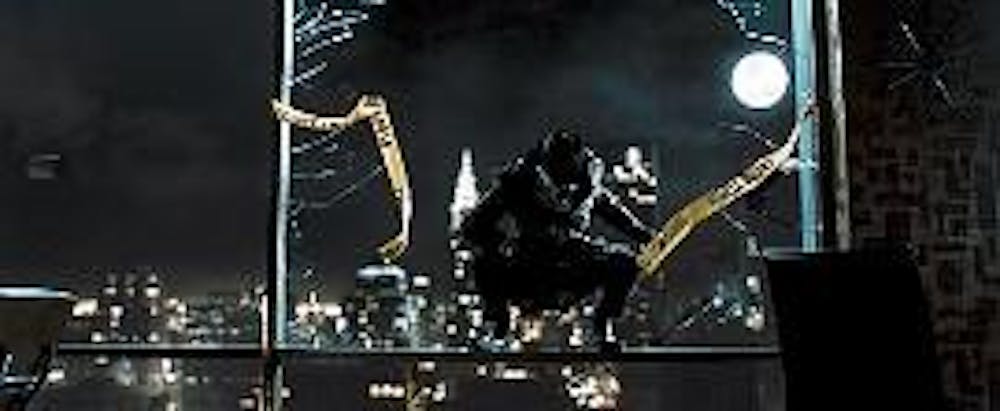In 1985, Alan Moore's graphic novel "Watchmen" deconstructed and analyzed superheroes, setting a new bar that is yet to be surpassed and laying the groundwork for the following decades of comic books. Now, Zack Snyder has managed to tap into that power, deftly adapting the genius that is "Watchmen" into a movie as brilliantly stylized as it is thematically relevant in a time where costumed heroes are inundating the silver screen.
As brilliant as it is, no such thing as a perfect adaptation exists - a rule to which the film "Watchmen" is no exception. To the uninitiated, Zack Snyder's "Watchmen" is a stroke of genius; to the initiated, it remains a work of genius, but one with, by my count, seven major deviations from Alan Moore's vision.
Never before have superheroes, masked vigilantes or crime fighters been looked at like in "Watchmen," the graphic novel or the movie. No other work manages to be as deeply thought out or reflective on its genre or the society that spawned it, revealing the world we live in for all its failings. Virtually any subsequent comic book you see with these elements was almost certainly inspired by "Watchmen."
While all comic books try to tie superheroes into our reality to some degree, Watchmen picks out various moments in history, starting in the 1930s, and inserts these men and women of skill, power and - more often than not - psychosis and personality disorders into the forces of history. Such events include the Cold War, John F. Kennedy's assassination, U.S. involvement in Vietnam, Watergate and the Soviet Union's war in Afghanistan.
Each of the so-called Watchmen is a deeply flawed individual, far more a product of the cold and dreary world around them than a shaper of it. The story starts with the murder of The Comedian (Jeffrey Dean Morgan), who somehow manages to make a cold-blooded murderer empathetic.
Much of the film is told in flashbacks as each of the characters reflects on their relationship with The Comedian. Unlike most movies adapted from comic books, only one character in all of Watchmen actually has any superpowers: Billy Crudup's Dr. Manhattan, a glowing blue, god-like being who can see the future and manipulate matter on a molecular level.
Together, the Watchmen weave a story that cannot be confused for "The Dark Knight," "Spider-Man" or any other superhero film. Snyder brings his unique style of brilliant musical overlays and compellingly stylized slow-motion choreography to an impossibly layered story and still manages to be largely faithful to the original without confusing viewers. The opening montage wraps audiences in a cocoon of this alternate universe, surrounding them with the notion of costumed heroes in our reality, altering our history and changing our relationship to the universe.
Compelling as the fight scenes are, "Watchmen" is neither an action story nor, even in the truest sense, a drama. It is an exploration - a whirlwind of energy and emotion. It is the accumulated magic and mayhem of men in masks fighting the good fight, gallivanting around for their own aggrandizement or just trying to find where men who dress up in tights and set out to fight crime actually fit into the larger world.
Moore is an entity unto himself - a genius of vast artistic vision whose abilities have made him a social recluse. As normal as he may speak, there is an unidentifiable inner energy to the man that belies a deep-rooted anger at Hollywood for what he sees as perversions of his work. Moore has vowed never to watch a single movie based off his work, lambasting Hollywood and telling anyone who will listen that every single adaptation of his graphic novels is sheer and utter garbage. Most adaptations of his work, however, have taken liberties while remaining essentially true to Moore's vision, whether he acknowledges it or not.
When it comes to Watchmen itself, Moore and his most devoted fans will see in the liberties taken by Zack Snyder a sacrilege. Those who have not read the graphic novel or those who understand that a perfect adaptation to screen from any form is impossible will see in "Watchmen" one of the closest adaptations humanly possible - a vision that could have come only from a deeply rooted fan like Snyder.
As close as "Watchmen" is to its source material, the liberties taken do run a high risk of alienating fans of the graphic novel. The important part is to remember that any adaptation is going to involve some level of artistic license and to realize how much Snyder got right instead of how much he changed. There can be no doubt that there is far more of the former than there is of the latter. The moral ambiguity, grittiness, sexual undertones, gruesome violence and a more real feel of superheroes than any other story are all there. Zack Snyder truly does watch the Watchmen, finding in it a film that is compelling, energetic and incredibly fun, even as it is deeply reflective and intellectual.
You can reach this writer at thescene@theeagleonline.com.





